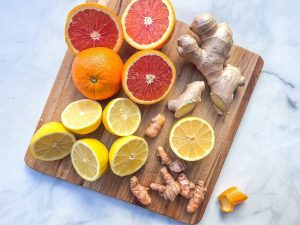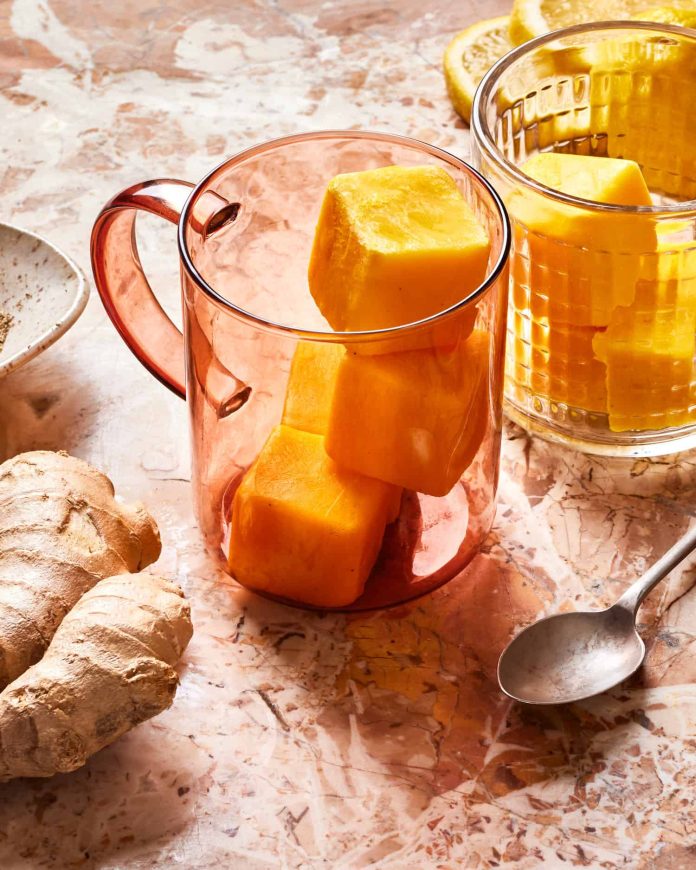With cold and flu season in full force, keeping your immune system strong should be a top priority.
On social media, there’s no shortage of trends to try that are supposed to keep bugs at bay. One example is the immunity cube, a blended, frozen concoction packed with delicious and nutritious ingredients.
On TikTok, a quick search for “immunity cubes” generates dozens of videos with hundreds of thousands of likes.
While different people make their immunity cubes different ways, they tend to have the same general ingredients and preparation: Throw orange, lemon, ginger, turmeric, raw honey, black pepper and coconut water into a blender, and freeze the liquid in ice cube trays. Then they’re ready to add to hot water, tea or a smoothie.

But do immunity cubes really pack in all the benefits that social media users claim? Are there any risks to trying them? Here’s what a dietitian and an infectious disease doctor say.
What are immunity cubes?
Immunity cubes are so named because they’re frozen cubes made of ingredients that some research shows may help boost the immune system and your health overall, registered dietitian and cookbook author Frances Largeman-Roth says.
Immunity cube ingredients typically include some combination of:
- Orange
- Lemon
- Ginger
- Carrots
- Turmeric
- Raw honey
- Black pepper
- Coconut milk
- Coconut water
- Water
The ingredients are then blended, strained (depending on preference) and frozen in ice cube trays. You can add a cube to a hot or cold drink as desired.
Cookbook author Nicole K. Modic, known online as Kale Junkie, has one of the most popular recipes on TikTok.
Do immunity cubes actually work?
Immunity cubes may help boost your immune system. “These are all fantastic ingredients for supporting immune health,” Largeman-Roth says. However, “once you’re already sick, all they can do is help to potentially cut your sickness short by a bit and help alleviate symptoms.”
Consuming more than two immunity cubes a day is discouraged because more than 200mg a day of vitamin C can cause diarrhea
Ginger can combat nausea and has anti-inflammatory properties, which can help reduce pain, Largeman-Roth explains.
Turmeric also has been used in ayurvedic medicine for centuries for its health benefits.
Vitamin C, found in oranges, lemons and coconuts, can become depleted when you’re sick, so it’s important to meet your daily requirement to support immune function, she says. That’s 75 milligrams a day for women and 90 milligrams a day for men.
Honey also has many health benefits, such as soothing sore throat and boosting gut health with its prebiotic properties, per Largeman-Roth. And water, of course, keeps you hydrated, which is necessary for many bodily functions.
Making immunity cubes is something that Largeman-Roth says she’d recommend to people who have time to do so; if not, she advises eating an orange and drinking a cup of hot water with honey, or simply making a smoothie out of the ingredients.
But she does discourage consuming more than two immunity cubes a day. That’s because more than 200 milligrams a day of vitamin C can cause diarrhea. And keep honey away from children under 1 year old, she stresses.
ALSO, take other precautions to reduce your risk of illness, such as vaccination, wearing a mask, washing your hands and social distancing
Dr. William Schaffner, infectious disease specialist at Vanderbilt University Medical Center, agrees there’s little harm that could come from trying out the immunity cube trend — as long as you continue to take other precautions to reduce your risk of illness, such as vaccination, wearing a mask, washing your hands and social distancing.
“(Immunity cubes are) not going to give you a proverbial suit of armor against viruses and other infections,” he says. “There’s not really a scientific basis for it.”
But “there’s no reason that there (would be) adverse events associated with this,” Schaffner adds. “We just don’t want people to become so enthusiastic about it that they think that it’s the only thing to do.”
How to make immunity cubes
- Blend 1 lemon (chopped), 1 teaspoon turmeric, 1 teaspoon black pepper, 3 pieces of raw ginger, 1/3 cup of raw honey, 1 orange (chopped), 1/2 cup coconut milk, 1/2 cup water.
- Pour blended ingredients into ice cube trays and freeze.
- Add to any smoothie, mocktail, tea or hot water.


